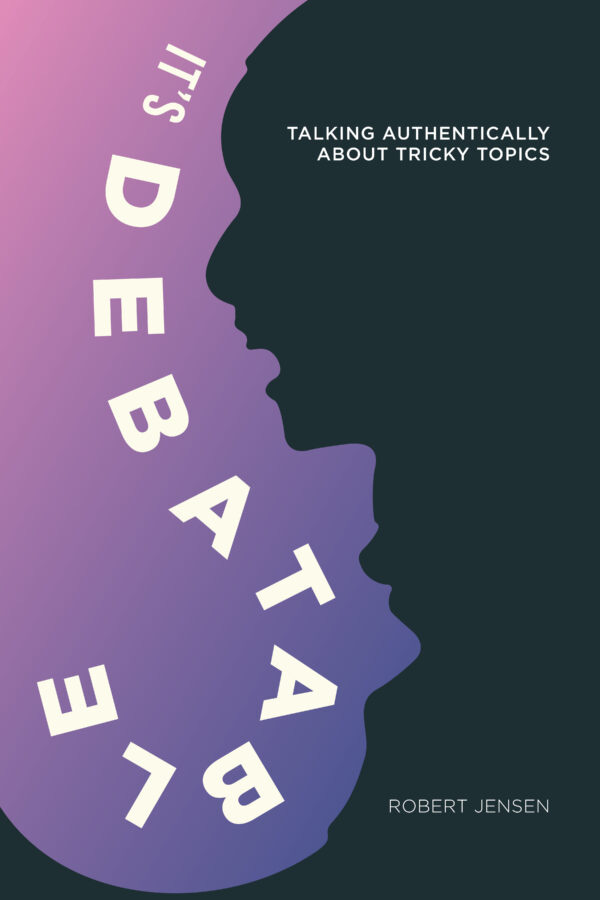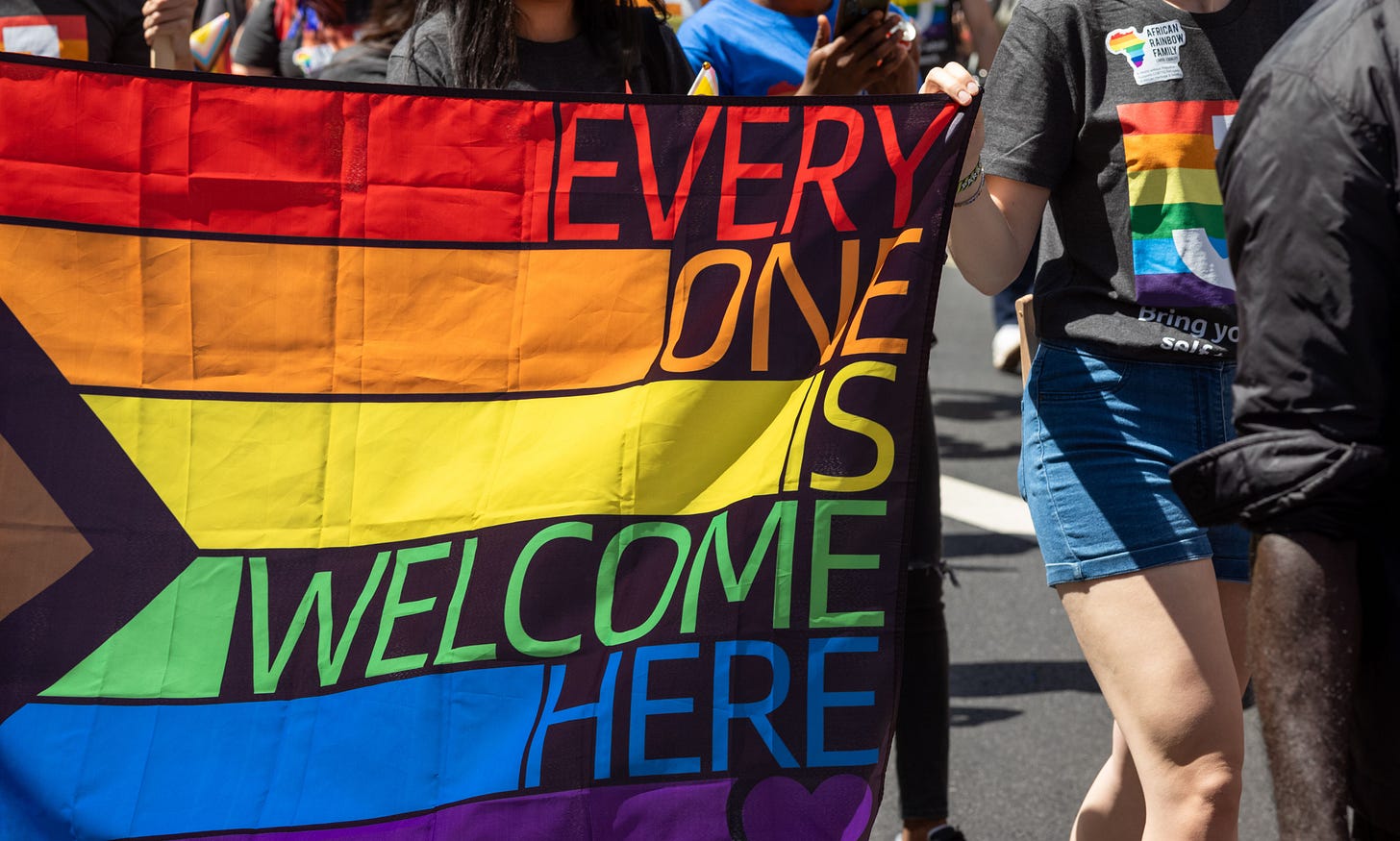This essay is adapted from the chapter of It’s Debatable: Talking Authentically about Tricky Topics (by Robert Jensen) that the publisher would not include in the printed book or e-book. But that chapter is available free online. For more details, go to https://robertwjensen.org/books/its-debatable/.
Many people like to joke about the expanding acronym for what began as the lesbian/gay movement and has grown to LGBTQIA+ (for the time being, at least).
The problem isn’t with the number of letters, unwieldy though it may be, but the way the letters don’t all fit together very well, especially the T. Linking transgenderism to the movement for lesbian and gay male liberation obscures how fundamentally different the two movements are.
London Pride, 2024
Lesbians, gay men, and bisexuals have long argued that their sexual orientation is not pathological and that they do not need treatment, but simply need to be left alone, free from violence and discrimination. That’s why the LGBT (lesbian, gay, bisexual, trans) label is confusing—the L, G, and B have little in common with the T. Adding more letters, such as QIA+ (queer/questioning, intersex, asexual, and many other terms) confuses more than clarifies.
Lesbians, gay men, and bisexuals—along with everyone else—can support the transgender movement’s goal of ending violence and discrimination in such things as policing, employment, and housing without endorsing the dominant ideology of the trans movement. That ideology denies the reality of sex (which is binary and biological) and replaces it with an internal subjective experience of gender (rejecting the longstanding feminist analysis of gender as social norms imposed in patriarchy). Progressive politics do not require that anyone support risky medical treatments or claims by males who identify as women to have a right to be in single-sex female spaces, such as changing rooms.
Here’s another way to make this point to people supporting transgender ideology: If you learned that a child you loved was gay or lesbian, how would you react? Is that different than how you would react if you learned that child reported gender dysphoria and wanted medical interventions (puberty blockers, cross-sex hormones, surgery) that have not been proven safe or effective? Even strong supporters of the transgender movement’s policy demands are hesitant to equate the two.
Depending on where one lives, children coming out as lesbian or gay might face violence and abuse. Lesbian and gay kids often get bullied, no matter where they live. But the challenges of being lesbian or gay are social. Lesbians and gay men may seek psychotherapy, not (except in rare cases) to change their sexuality but to deal with the pain of being stigmatized and/or the emotional problems that many people experience. Lesbians and gay men don’t need medical treatment because same-sex attraction is not pathological, not the result of disease.
Kids acknowledging same-sex attraction need social support, which progressive people are usually eager to provide. That’s quite different from embracing invasive medical procedures for kids who identify as trans.
That’s the contradiction at the heart of transgender ideology. Medical treatment is appropriate to treat disease and injuries that pose a threat to a person’s health. If trans activists argue that in some cases, drugs, cross-sex hormones, and surgery are medically necessary, that is a recognition that at least in some cases, transgenderism is a pathological condition that requires treatment. Yet the transgender movement also argues that transgenderism should not be pathologized. Proposals for a World Professional Association for Transgender Health language policy include:
Avoid language which has the intention (or likely effect) of stigmatizing or pathologizing gender and bodily diversity (including a diversity of gender expressions and identities, as well as bodily characteristics). Stigmatizing and pathologizing language (e.g., “disordered” or “abnormal” or “malformation”) should be avoided altogether.
David Tennant, who peddles the notion of ‘trans children’
When Spain passed a law allowing anyone over 16 to change their gender on legal documents without undergoing psychological and medical evaluations to show gender dysphoria, the minister of equality stated: “Trans people are not ill people. They are people, full stop.” The statement is hard to understand. In the context of other medical conditions, no one suggests that people who are ill are somehow lesser people. These two claims—that trans is merely one aspect of human diversity but yet also is a condition requiring treatment—are contradictory.
Even when acknowledging that, trans activists try to deny it. Masha Gessen, a female journalist who identifies as trans and nonbinary, found it difficult to explain this contradiction in an interview:
Being trans is not a medical condition, but it marries you for life to the medical system. It almost always—not always—involves some kind of medical intervention. … I hate using the word “treatment.” I’m always stumbling over it because it’s not actually treatment, but it is treatment. But it’s not a medical condition.
Given how little we know about the etiology (the cause or set of causes) of gender dysphoria, there’s not much we can say about what transgenderism actually is in definitive terms. But whatever one believes transgenderism is, it can’t be both a routine part of healthy human diversity and a condition requiring medical treatment. If one isn’t ill in some way, why would one need such treatment? Simply saying there are lots of different types of trans people doesn’t get us any closer to understanding what the terms mean.
This issue arose when the American Psychiatric Association revised the Diagnostic and Statistical Manual of Mental Disorders to eliminate “gender identity disorder” in favor of “gender dysphoria.” One medical news website pointed out the tension:
[W]hile the move is seen as a win by some, others worry about what it could mean. Currently, insurance carriers may pay for sexual reassignment surgery because the procedure is for a medical problem, not for plastic surgery. Having the condition reclassified may cause problems with surgery for an already marginalized group.
A trans scholar who states that “gender identity and gender assigned at birth is increasingly understood as a matter of human diversity rather than as pathology” notes that the DSM and WPATH definitions of gender dysphoria are different, and therefore:
[C]linicians should not routinely diagnose patients who wish to access transition-related interventions with gender dysphoria. A diagnosis of gender dysphoria should be limited to situations in which it is genuinely necessary (such as for insurance coverage) or is done at the express request of the patient.
What responsible physician would consider a diagnosis “genuinely necessary” based on insurance or when the patient requests it? It’s an understatement to conclude, as did one research team, “All physicians included in gender dysphoria treatment are facing great bioethical challenges and dilemmas.”
This contradiction—don’t think of trans identity as a pathological condition but embrace medical treatment to “fix” the bodies of those who identify as trans and want drugs, hormones, and/or surgery—is a feature, not a bug, of the movement’s ideology.
Society should provide people with gender dysphoria psychological support to deal with the distress, just as we should provide such support to anyone experiencing distress of any kind. But in other medical arenas, wariness about solving complex problems with drugs and surgery is common, such as when the American Academy of Pediatrics released guidelines on childhood obesity that advocated intensive therapy for children as young as 6, weight loss drugs for those as young as 12, and surgery for teens as young as 13. A journalist reported that professionals on both sides of the debate “express uneasiness about the potential long-term consequences of putting millions of children on drugs or under the knife, instead of doing more to prevent the condition in the first place” and quoted a leading medical ethicist:
“Turning to surgery and pills is quintessentially American,” said Arthur Caplan, a bioethicist at the NYU Grossman School of Medicine who said he struggles with weight himself. Caplan called obesity “one of the biggest moral challenges” our society faces but described medication and surgery as just “Band-Aids in a society that can’t figure out what to really do to protect the interests of its kids.”
Those comments reflect a concern for the health of children and a wariness about rushing to industrial solutions. A parallel analysis of gender-affirming health care is appropriate but would generate accusations of transphobia. Simply challenging the appropriateness of LGBTQIA+ can make one a target.
Let’s go back to the remaining letters. First, a small portion of the human population is born “intersex,” with what are called disorders of sexual development, although some prefer differences in sexual development. There are important questions about treatment for those conditions, but they are separate from issues involving sexual orientation or transgender ideology.
The other letters raise other issues. I don’t use the term “queer,” either as a synonym for lesbian and gay, or as an all-encompassing term for “something other than heterosexual.” The term can’t be separated from “queer theory,” a postmodern academic fad that sometimes anti-feminist and always weighed down by unnecessary jargon. The recent explosion of terms such as asexual (along with pansexual, demisexual, and on and on) describe, if anything, psychological states or personal preferences that typically don’t have public-policy implications.
Many people I know with progressive politics accept the alphabet-soup label out of a desire to not rock the boat, with an unstated plea, “Can’t we all just get along?” There’s no reason we can’t get along while also airing principled disagreements about complex questions.
I continue to support the lesbian, gay, bisexual movement. I also critique the contradictions and confusion in transgender ideology and reject the trans movement’s policy demands that aren’t based on sound medical standards or undermine women’s right to privacy and safety. I support people born intersex in their quest for dignified medical treatment. As for the many other labels that people want to claim, well, I wish them well in their attempts to understand themselves and form communities.
These positions are, to me, all consistent with critical thinking and progressive politics.
------------------
It’s Debatable: Talking Authentically about Tricky Topics, published by Olive Branch Press, June 2024
Robert Jensen, an Emeritus Professor in the School of Journalism and Media at the University of Texas at Austin, is the author of It’s Debatable: Talking Authentically about Tricky Topics from Olive Branch Press. His previous book, co-written with Wes Jackson, was An Inconvenient Apocalypse: Environmental Collapse, Climate Crisis, and the Fate of Humanity. To subscribe to his mailing list, go to http://www.thirdcoastactivist.org/jensenupdates-info.html.








Homosexuality exists because sex exists. There is female and male, nothing more.
There is no such thing as "transgender" because humans do not have a gender or gender identity. Those do not exist. Gender is a linguistics term for words only.
A male who "feels like" he is a female is delusional and mentally ill. There are no "trans" people. There is no special category for those who refuse to accept the reality of their sexed body.
This is unsustainable. A lie about material reality cannot be sustained in this way. When a male demands that the whole world lie to him due to his perversions, it will lead to male rapists in women's prisons, males destroying women's sports, and lawsuits against anyone who refuses.
It's impossible. There is no "T." It does not exist.
To whom you are attracted sexually is purely subjective and therefore cannot reasonably be contested by an outside observer.
Where you decide to live your life on a spectrum of superficial, stereotypical male to female attributes (and we all do) is also purely subjective and similarly cannot be questioned.
However, your biological sex reflects an objective reality which cannot be changed by your subjective personal view and futile attempts to do so can result in serious health impacts to you as well as harms to members of the sex you are impersonating (primarily women).
Others who are grounded in objective reality should never be forced to accept your subjective version of your actual biological sex.
Finally, it's past time for the LGB community to separate themselves from the trans activists who are trying to take away the rights of women to fairness in sports and to privacy and safety in their restrooms, locker rooms and prisons. They also advocate for the chemical and surgical mutilation of children.
Their actions are evil and the
understandable negative reaction to the harm they are causing is spilling over to innocent people who are just going about their business, marrying and leading their lives.